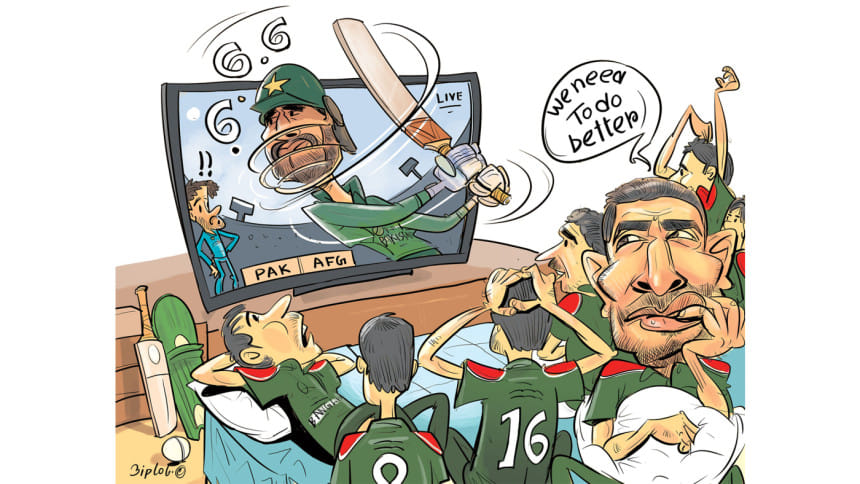Can Tigers hurdle the mental block?

Bangladesh suffered a shock defeat against associate members Scotland which led to the Tigers qualifying from their first-round group of lightweights as runners-up and then saw Sri Lanka snatch victory from the Tigers' grasp in their opening Super 12 game of the T20 World Cup. But the three-run defeat to the West Indies on Friday was still the hardest pill to digest.
What happened at the Sharjah Cricket Stadium on Friday will haunt Bangladesh fans for a long time. The agonising defeat to the defending champions was brutal because it not only prolonged the Tigers' wait for a first win in the Super 12 stage, but also because it exposed everything that has been wrong with Bangladesh's cricketing approach, at least in the T20 format, for a while now.
"What Bangladesh need is to show some courage now to get back to winning ways," former Bangladesh skipper Mashrafe Bin Mortaza said live on Facebook after Bangladesh plummeted to the bottom of their group with three losses from as many games.
Mashrafe is probably right. The Tigers need to be courageous, probably as courageous as Pakistan's Asif Ali was just hours later in Dubai, showing belief and confidence that he could take his team to a resounding win inside just an over. He targeted that penultimate over from Afghanistan's Karim Janat and struck him for four sixes, achieving the 24 needed off 12 with six balls to spare.
In fact, a retrospective look at the Afghanistan-Pakistan clash could show the Tigers what they have been missing throughout this tournament. Afghanistan had battled back from 76 for six after 12.5 overs to post a challenging 147 for six against a side that has been flying high since opening with a thumping win over arch-rivals India.
The Afghans did not give up even when Babar Azam's 50 helped Pakistan to a position from where the chase seemed like a formality.
Instead, they picked the brains of their senior players and decided that Rashid Khan, their most lethal weapon in crunch situations, would bowl out his final over.
Rashid did the trick, scalping the most important wicket of Babar in the 17th over, and as Naveen-ul-Haq removed Shoaib Malik while giving away just two runs in the next over, Afghanistan roared back into the game before Asif staged his carnage and shattered their hopes.
The lessons from this enthralling encounter are that the T20 format demands the can-do attitude till the final delivery of the game and an appropriate plan targeted towards what needs to be achieved.
Bangladesh do not have a power-hitter like Asif who can change the complexion of a game inside a single over. What the Tigers can do however is plan a chase in phases.
It seemed like their plan was working against the Windies until Mushfiqur Rahim, who had just ended his lean patch and was in good touch, decided to play a scoop shot when Bangladesh needed only 53 off 40 deliveries with seven wickets in hand.
Had Mushfiqur decided to not give in to his unyielding penchant for unconventional shots, perhaps Mahmudullah would not have been burdened with the need for smashing a boundary in the final delivery of the game.
Before that, even after reducing West Indies to 70 for five after 14 overs, Bangladesh conceded 72 in the last six overs despite Shoriful Islam conceding just eight runs and scalping two wickets in two of those final overs.
It was as if the missed chances -- two dropped catches of Roston Chase and the missed stumping of Nicholas Pooran, the eventual player-of-the-match for his quick-fire 40 -- took away the can-do attitude from the Tigers, who found no way to regain momentum. That was the case during the defeats to Scotland and Sri Lanka as well.
Bangladesh are almost out of the tournament. With just two games left, all Mahmudullah's men can aspire to do is to portray a champion-like attitude, like Asif Ali and the Afghan side, in their final games against Australia and South Africa before heading back to the country.

 For all latest news, follow The Daily Star's Google News channel.
For all latest news, follow The Daily Star's Google News channel. 



Comments